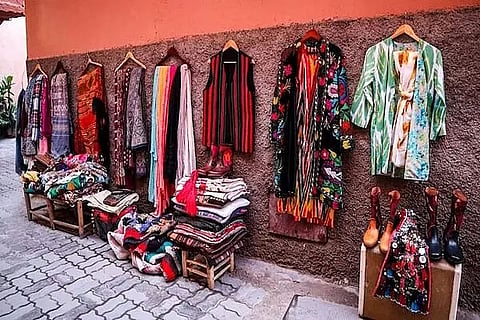
- Home
- Live Blog
- Breaking News
- Top Headlines
- Cities
- NE News
- Sentinel Media
- Sports
- Education
- Jobs

Sir Winston Churchill famously said, "Never let a good crisis go waste" as he worked to help form the United Nations, after World War 2 crisis. Fashion pundits across the world seem to agree with him unanimously, as they discuss the road ahead for fashion and its various stakeholders.
In a recently conducted webinar conducted by Sujata Assomull, Founding Editor In Chief of Harper's Bazaar, India, stake holders in the industry came together to map out the road ahead. On the panel was Dipali Goenka (CEO & Jt. MD, Welspun India Ltd), Punit Lalbhai (Executive Director, Arvind Limited) and Katrin Ley, Managing Director, Fashion For Good, who discussed the current scenario as an opportunity to inspire the industry to walk towards better productivity in fashion.
Innovation, reduction in carbon footprints, a renewed supply chain system are some of the key points that the guests discussed. While Goenka emphasised on innovation and stressed on "green" revolution in the sector, Punit Lalbhai pointed out that the Pandemic era is the perfect time to "question the sacrosanct"! Lalbhai emphasise why one should mull over what is considered the "norm" before embracing change, be it the Work from Home concept or a staggered workforce, and finally pushing sustainability to the forefront.
Katrin Ley from Fashion For Good, the global platform for collaborative innovation in the fashion industry rightly pointed out that along with the economic impact and slump in the fashion industry, the social and environmental aspects have been hit too. What is sustainability in fashion?
"Sustainability is something that allows us to perpetuate indefinitely into the future," says Lalbhai. He points out the 7 major parameters in the manufacturing process of the textile business- Money, People, Water, Raw Material, Chemicals, Energy and Waste — where partnerships with brands, social stakeholders like municipal bodies, farmers and the startup ecosystem have proved fruitful in moving towards sustainable goals.
Innovation and sustainability are intertwined: Innovation and sustainability will work hand-in-hand. A drive towards innovation starts from consumer needs and desires. One sees moving away from a linear to a circular economy, innovation happens to be one side of it. It is embedded in the supply chain. The story starts from scrap yards. Can the scrap yard become the wealth for the manufacturers, can we start using recycled plastic instead of emerging plastic and steer it to the supply chain, asks Goenka. Adding, it will be interesting to see the circularity of "farm to shelves and back to farm" becoming the new normal as the onus remains on the textile manufacturers to find a solution as the industry is one of the world's largest consumer of water, and contributor to questionable landfills and cotton.
How sustainability/innovation matches the Supply-Demand dynamics: The advent of coronavirus has brought a change in the demand side of the business in recent times. More and more companies are manufacturing PPEs, innovations drives with the advent of anti-viral clothing, fabrics and textiles etc.
Role of Digitisation:With the new normal shifting towards a holistic approach, fashion's stakeholders are more and more inclined towards embracing digitisation.
"Digital Acceleration in e-commerce in the form of virtual showrooms, supply chain transformations too are going to see a massive change as the world practices social distancing norms; even practices like auditing are going to be virtual," says Ley. (IANS)
Also Watch: Mankachar Villagers Under Water